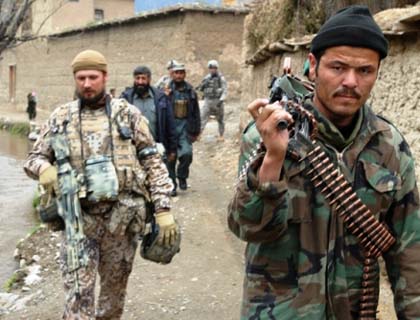U.S. Secretary of Defense Leon Panetta recently made comments suggesting that U.S. combat role would end in Afghanistan by mid-2013. This came as a shocker to many. The U.S. had insisted – in fact, cajoled other NATO members – to contribute troops and resources to the Afghanistan war. Other U.S. officials tried to do damage control, but Panetta set the tone for the May Chicago conference, where the final timetable of withdrawal will be decided.
These comments came just before the NATO defense ministerial meeting in Brussels, where discussions were supposed to be held on the future size of the Afghan national security forces (ANSF). NATO member countries are going through a tight financial squeeze, so the appetite for sustaining a 350,000-strong security force for Afghanistan – the current projection for Oct. 2012 – was not strong. France said it would be happy with a 230,000-strong force, while the U.S. preferred 227,000.
Either way, the cost factor was the most important in those calculations. It was less about how many troops would be necessary to defend Afghanistan against the insurgency, and more about how much money was needed to sustain the Afghan forces. The discussion had shifted from a security policy perspective to a predominantly financial austerity perspective. To be sure, policymaking is always a balancing act between scarce resources and optimal policy outcomes, and mostly the outcomes are as important in the final analysis as the money. But in this discussion, it was the other way around.
So, as the U.S. is cutting down its troops and further accelerating the drawdown, it is also pushing for a smaller ANSF. At the same time, American diplomats are trying hard to make the ongoing negotiation efforts with the Taliban work. If there is anything that screams "we're negotiating from a position of weakness," it would be this. ISAF is leaving Afghanistan and leaving behind a small and less capable force to fight the insurgency. Before they leave, they are attempting to dissuade the Taliban from violence and integrate them into the government — not as the Islamic Emirate of Afghanistan but as a smaller group that shares a fraction of power. That is impossible to do as long as the Taliban remain more powerful than the ANSF.
The world often forgets that after the withdrawal of ISAF troops – to be completed within the next two years – Afghanistan's forces will be the first line of defense against the Taliban and their Al Qaeda affiliates, who are still peddling their agenda of global terror. Overnight, the responsibility of the Afghan forces will broaden from just protecting the Afghan people and keeping the government intact to ensuring that Al Qaeda does not re-establish a foothold in the country and use it as a center for their global agenda.
Precisely at a time when the Afghan troops need the greatest help, their numbers are being cut, material and training support is being scaled back and their budget – a fraction of the cost of keeping international troops in Afghanistan – is being slashed. The Afghan forces depend heavily on U.S. and NATO troops for battlefield medical support, airpower, logistics and troop transport. With the withdrawal of international forces, Afghan troops' capability to conduct effective counter-terror and counterinsurgency operations is going to be severely affected.
If anything, the Afghan forces need to be supported, trained, equipped and increased in number. Diminishing their strength and scaling back their resources at a critical juncture such as this is a lose-lose proposition on many levels.
First, while talking with the Taliban, U.S. negotiators will find it harder to argue for things that are not on the top of their national security agenda — important things like women's rights, girl's education, minority protection, human rights, etc. Second, the U.S. or its partner countries have not announced or debated any special increase in civilian aid as they have contemplated withdrawal and cutting ANSF funding. A funding shortfall in the face of a growing insurgent threat and a hostile neighborhood will inevitably force Afghanistan to prioritize defense over development.
Third, the U.S. and its allies seem to be largely ignoring the concerns of the political opposition, which is growing increasingly paranoid as they see Afghanistan's future direction being negotiated almost exclusively between the Taliban and the U.S. This does not bode well for any future negotiated settlement where the opposition's demands are not factored in.
Amid fiscal belt tightening, growing war-weariness and election-year politics, the international community is pursuing the exact policy it should not. It is inevitable that Afghanistan's security forces will have to be downsized, but that should only happen when the current heightened state of security threats has been addressed. It is also inevitable that the international community will stop funding Afghanistan's forces, look for a solution other than protracted war and withdraw their own forces. But the current strategy – if it can be called that – does not constitute an optimal combination of these realities. If anything, it seems like the best strategy for failure in Afghanistan.

